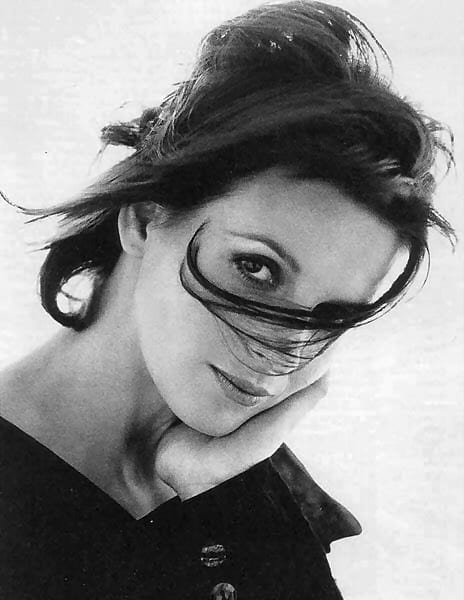
I have found an article on the MundoCine site that I found exceptional, both in its form and in its subject matter. Honoring the excellent actress Juliette Binoche, Mark Monk he has done an excellent job. Here I leave the article, for you to enjoy.
«Over the years, the actress Juliette Binoche has become an important and significant reference in European cinema.
He does not have the nerve, the resolution in the gesture, perhaps the personality of Isabelle Huppert, but he does offer in exchange a face (the fascinating geography that the director must explore with the camera, said Dreyer) whose characteristic is not beauty or spectacularity, but a quality of introspection.
Penetrating the gaze of Juliette Binoche is already a poetic act, a view also to our own interior; Perhaps it is simply magic, or the extraordinary conjunction of eyes on the edge of tears, elegant lips that can affirm or deny with equal veracity, or the cold skin that makes her so distant but also strangely close, but the truth is that Juliette Binoche acts with her face and expresses ideas with it, few actresses can achieve it like her. It has been said on occasion: "it can convince you that it is thinking without having to do anything in an obvious way."
Juliette Binoche's first major film was “I greet you, Maria” directed by none other than Jean Luc Godard. It was 1985, and in the same year the young actress will also work with another prestigious director, André Techiné, in “Rendez-vous”.
In 1986 she produced her first collaboration with the strange director Leos Carax, in the film "Bad blood", whose theme revolves around AIDS, but it will be in the following season when Juliette Binoche attracts international attention with "The unbearable lightness of being" .
Already in 1991, "The Lovers of Pont-neuf" obtained a great success, directed again by Leos Carax.
The same year that she filmed the adaptation of "Wuthering Heights", Juliette tries to change her habitual register with "Wound", a film of sounded eroticism that unites meat with meat to Jeremy Irons in a shoot under the orders of Louis Malle, during which both actors end up not supporting each other.
The definitive change for the actress comes with the first film of the trilogy of the three colors of the French flag - "blue", "white", "red" - directed by the Polish Krzysztof Kieslowski. Juliette stars in the first of the series, "Azul", from 1993, although she appears in a cameo in the next two; Before filming began, he had rejected, without hesitation, a role in Spielberg's great “Jurassic Park”, for which many actresses would have killed.
"Azul" would succeed in the Cesars, the Felixes and in Venice, and would embed Juliette in a kind of introspective, static, reflective character in which many of us still recognize her. In Kieslowski's film, she plays the wife of a famous composer who is left a widow after a traffic accident that was brilliantly visualized at the beginning of the film. From this mishap we will see how the character basks in his grief, tries to come out afloat and finally redeems himself. The director knew how to extract the maximum expressiveness with the minimum gesture of the actress, a single word from her is enough to open the door of her thoughts and her inner pain. Exciting close-ups and small actions with no need for words, like Juliette walking alongside a stone wall as she lets her hand drag across the cutting rock until her fist bleeds.
After "Blue", Juliette becomes pregnant and takes a year off. Your son will be called Raphael.
In 1995 he participated in the most expensive film in the history of French cinema until then, "The hussar on the roof", directed by Jean Paul Rappeneau, where the actress plays Pauline de Theus.
The world of fashion will soon take advantage of the coveted face of Binoche, and a contract will be signed that makes her the image of Lancôme. She will shoot various clips and pose as a model in various photo shoots.
In 1996 he delves into the romantic comedy with "Romance in New York", with William Hurt as a co-star.
Juliette already deserved a massive recognition, a walk through Hollywood fame without losing, of course, the good eye that has always involved her in good quality films. The opportunity comes with "The English Patient", directed by Anthony Minghella, adaptation of the novel by Michael Ondaatje. It is an epic, terrifying and passionate melodrama (although boring and funny in the opinion of many), starring Ralph Fiennes, Kristin Scott Thomas, Willem Dafoe and Juliette herself as a caring nurse. Get the Oscar for best supporting actress, one more of the nine statuettes that the film obtains, in addition to being recognized at the Berlin festival.
In 1998 she made her debut as a theatrical actress in London, with a play by Pirandello, and she also shot “Alice and Martin”, again with André Techiné.
In 1999 "In Praise of Love", and in 2000 the shocking "Unknown Code", by Michael Haneke, where he gets one of his best performances, and if not, review the brutal scene in the subway, one of the most psychologically violent moments that I have seen in the movies.
"Chocolat," directed by Lasse Hallström, earns him a new Oscar nomination. To prepare for her role, the actress worked for a time in a chocolate shop in Paris. One of her last outstanding films, "Jet lag" (2003) pairs her with Jean Reno, the popular French actor. Also mention “In my Country” (2005) and “Hidden cache” (2006).